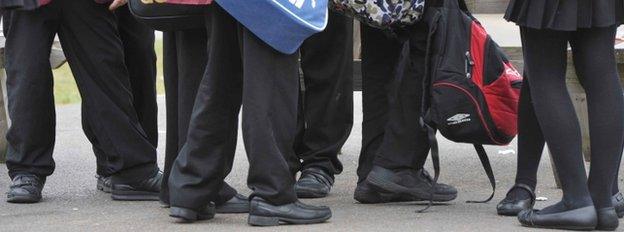School truancies lead to rise in prosecution of parents
- Published

Schools are taking 'a strong line' with parents who fail to stop their children playing truant
The number of parents taken to court in England because of children skipping school rose sharply last year, official figures show.
In 2014, 16,430 people were prosecuted for failing to ensure their children went to school, an increase of more than 3,000 - or 25% - on 2013.
Ministry of Justice figures, obtained by the Press Association, revealed more than three-quarters were found guilty.
Head teachers' leaders said good attendance was "absolutely critical".
Crackdown breakdown
The rise follows a crackdown on children missing school, including new rules on term-time holidays, external, which were introduced two years ago.
The 2014 figures, gathered in a freedom of information request to the Ministry of Justice, show:
12,479 people found guilty of truancy offences - up 22%
9,214 fines, averaging £172, issued by courts - up 30%
18 jail sentences in 2014 - compared with seven in 2013
Ten of those jailed and more than half (58%) of those fined for a child missing school were women
Parents can be issued with on-the-spot penalty notices of £60 per child by schools, rising to £120 if unpaid after three weeks, if their child has an unauthorised absence.
Failure to pay, or incurring two or more fines, can lead to parents being referred to the local authority's education welfare service, which has the power to take them to court.
Courts can issue maximum fines of £2,500 or jail sentences of up to three months.

Unauthorised holidays in term-time are no longer acceptable under rules introduced two years ago
"Good attendance is absolutely critical to the education and future prospects of young people," according to Malcolm Trobe, deputy general secretary of the Association of School and College Leaders.
"Schools have rightly responded to this overwhelming evidence by taking a strong line in identifying when children are absent without a valid reason, particularly where there is persistent truancy."
The Department for Education said it was a myth that missing school, even for a short time, was harmless to a child's education.
"Our evidence shows missing the equivalent of just one week a year from school can mean a child is a quarter less likely to achieve good GCSE grades, having a lasting effect on their life chances," a spokesman said.
"Heads and teachers are now firmly back in charge of their classrooms, and most recent figures show we have made real progress - with 200,000 fewer pupils regularly missing school compared with five years ago."
'Pressure from Ofsted'
But David Simmonds, of the Local Government Association, said the increase in fines reflected "tighter enforcement by schools that are under pressure from Ofsted to meet attendance targets", as well as a rising school population.
He called for more flexibility in the rules to allow heads to take account of family circumstances where absence was unavoidable.
They "should be trusted to make decisions about a child's absence from school without being forced to issue fines and start prosecutions in situations where they believe the absence is reasonable", he said.
Craig Langman, Founder of the pressure group Parents Want a Say, said families were being unfairly criminalised for taking their children out of school.
"Due to the ban on term time holidays the right to a family life is being severely compromised and it is hurting families across the country.
"Parents Want a Say will continue to campaign to reverse term time holiday rules - this is a debate about family rights and the education system."

'I was fined £996 for holiday'

Parent Stewart Sutherland said he felt "very sore" to be fined for taking his children on holiday in term time - and left with costs to pay after challenging the penalty in court.
Mr Sutherland, who works for the Ministry of Defence, told the BBC Radio 4 Today programme he had missed the chance to get time off work during the school holidays for the fifth year running.
Instead, his family went away a week after the six-week summer holiday, missing the first week of term.
"We returned with the penalty notices - £60 per parent, per child - for taking the children on holiday," he said.
"We got in touch with the council to explain the circumstances to explain why we took them out, got told it was the school's decision.
"We got in touch with them and I was basically being bounced from pillar to post to be told there was no appeal process, the only time people would listen to me was if I went to court.
"£996 was my total fine in the end from the courts and I've also now got a criminal record for taking my kids on holiday."
Listen to one mother's story: My daughter got more out of Europe trip than school

Rachel Burrows, of the parenting website Netmums, said a fine or threat of jail could be enough to make parents understand the seriousness of their child missing school.
However, she warned there was no one-size-fits-all solution.
"In many cases, the family may be in crisis or face issues such as a parent with mental health problems or addictions.
"In these cases, fines or jail won't help, as the mum or dad needs professional support to turn their lives around and be a better parent."
Russell Hobby, general secretary of the National Association of Head Teachers, which has produced guidance, external on truancy, said fines and sanctions should be a last resort.
"Persistent and extended absence must be tackled by schools with support and dialogue first," he said.
"Equally, though, government must do what it can to support families. Cutbacks to essential services can increase the barriers to attendance."
- Published25 March 2015

- Published27 October 2014

- Published25 March 2014

- Published30 October 2013

- Published15 January 2014

- Published26 April 2012
